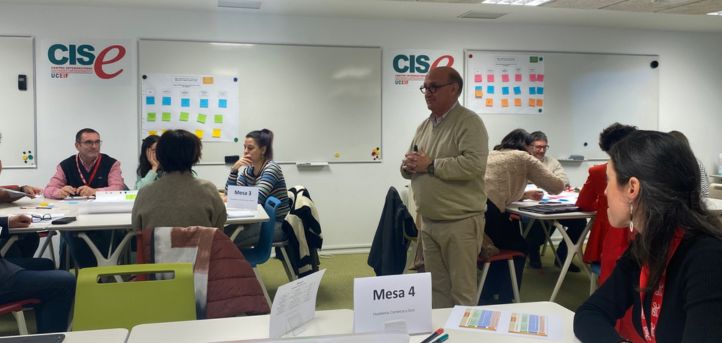Last Friday, November 24, the Director of Institutional Relations of the Universidad Europea del Atlántico (European University of the Atlantic, UNEATLANTICO), Elena Palacio, attended the Encuentro RIS3 (RIS3 Meeting) in the “Industry, Culture, and Sustainable Tourism” ecosystem organized by the Centro Internacional Santander Emprendimiento (Santander Entrepreneurship International Center, CISE).
The conference was inaugurated by Javier Puente, General Director of Innovation, Technological Development, and Industrial Entrepreneurship of the Government of Cantabria, together with Ignacio Rodríguez, Director of Innovation and Awareness Areas at CISE. Enrique Salas, an expert in leadership, change management, and business transformation, then explained the day’s agenda.
The main focus of the day was the formation of groups to set up different working groups. Each of the four tables had a topic of interest in terms of innovation and future projects. Among the topics to be discussed were natural heritage and conservation; caves and archaeological sites; ecosystem and cultural infrastructures; as well as hospitality, commerce, and leisure.
Because of her professional background, Palacio was part of that fourth table dedicated to hospitality, commerce, and leisure in which her team had the task of reviewing the challenges in these sectors and selecting the most important ones in terms of present and future impact. The next step was to work on an examination of the various difficulties that can be encountered in the hospitality, retail, and leisure industries to understand the obstacles to be overcome in the aforementioned sectors.
After reviewing the topics, a tentative plan of approach was drawn up, with actions to be considered in order to meet the challenges of each topic. Finally, the teams at each table drew up a road map showing the most important milestones of the work carried out.
The main topics of the work carried out by the group in which Palacio collaborated were the means available in the region, the importance of exporting local culture and the relevance of cultural offerings for local tourism, as well as the need for a useful communications network.
The representation of UNEATLANTICO in events of such importance, such as those organized by the Centro Internacional Santander Emprendimiento, is a clear demonstration of the importance that the university gives to promoting initiatives in different sectors such as the cultural industry or innovation, collaborating with other organizations.
It should be noted that another of the actions that UNEATLANTICO has worked on over the years has been the activation and monitoring of the Cátedra de Cultura Emprendedora y Empleabilidad (Chair of Entrepreneurial Culture and Employability).


